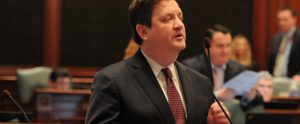State-funded sexual harassment payoffs now banned
By Gregory Harutunian For Chronicle Media — August 22, 2018
Sponsored by state Rep. David McSweeney (R-Cary), House Bill 4243 was prompted by reports that uncovered a taxpayer-financed federal fund used for payments to persons making allegations of harassment against members of the U.S. Congress and their staff
Prompted by the spate of sexual harassment allegations brought by victims against state legislators and staff within their offices in the last year, Gov. Bruce Rauner signed into law legislation that “prohibits the use of public funds to buy silence or inaction related to allegations or investigations of sexual harassment by a member of the General Assembly.” The Aug. 10 action takes effect immediately.
Sponsored by state Rep. David McSweeney (R-Cary), House Bill 4243 was prompted by reports that uncovered a taxpayer-financed federal fund used for payments to persons making allegations of harassment against members of the U.S. Congress and their staff. The recent sexual harassment claims, made at the state level, had no protection from the same clandestine practices, including district office funding allowances for discretionary use.
“Under no circumstances should taxpayer funds be used to silence sexual harassment cases involving elected officials,” said McSweeney, in a press release. “This is an important and proactive step given the troubling culture of sexual harassment in Springfield. Illinois taxpayers will not have their hard-earned money spent on covering up incidents of harassment and abuse.”
The bill amends the General Assembly Compensation Act, and states, “(A) Prohibition on sexual harassment payoffs, notwithstanding any other provision of law, no public funds, including, but not limited to, funds appropriated for office allowances … shall be paid to any person in exchange for his or her silence, or inaction, related to an allegation or investigation of sexual harassment, as defined … in the State Officials and Employees Ethics Act, committed or allegedly committed by a member of the General Assembly.”
The House voted unanimously 113-0 to approve the measure April 13, and the Senate followed suit May 23 with a unanimous 58-0 vote, on its third reading, before it was sent to the governor for signature June 21. Sen. Tom Cullerton (D-Villa Park) sponsored the legislation in the senate.
McSweeney has also sponsored legislation to address the flaws and gaps in legislation and policy that led to the Chicago Public School officials’ gross mishandling of sexual abuse and assault cases that occurred at schools within the district, earlier this year. House Bill 5914 was filed June 13, but awaits further action in the legislative session this fall.
“The mistakes made by the schools in Chicago are reprehensible,” McSweeney said. “Nothing like this should ever be allowed to happen again. These cases were handled atrociously by CPS, and they were allowed to get away with it because of shortcomings in state law … while this is a significant issue in Chicago, this is also a statewide problem. This isn’t just on CPS, these failures exist in state government as well and need to be fixed as soon as possible.”
A press release stated, “A(n) … investigation identified 72 school employees, as alleged perpetrators, in the last decade in schools all across Chicago. They found that CPS conducted shoddy background checks, which led to the hiring of educators with red flags in their records, several of whom went on to commit abuses at CPS schools. Among those that left CPS after being investigated, several were rehired elsewhere.”
HB 5914 mandates that the Illinois State Board of Education must be aware of, and monitor, the process with regard to each individual background check, conducted by school districts. It also amends the Freedom of Information Act, allowing school districts to disclose the disciplinary records of school district personnel relating to sexual abuse, along with internal investigative findings and meted discipline, to another school district.
“Any arresting agency is required to share its reports pertaining to the arrest of a licensed educator with the superintendent of any school district that employs the educator.” It also will require school boards to report all credible cases of sexual assault, or abuse, by a licensed educator to the State Board of Education, establish a hearing procedure for student victims, and ensure a licensed educator, under investigation by the state Superintendent of Education, is reassigned to nonclassroom duty.
McSweeney noted, “This comprehensive legislation is a solid start, and a good base, that we can amend as further policy recommendations are given, or more legislative gaps come to light.”
McSweeney’s 52nd legislative district includes Barrington Hills, Cary, Crystal Lake, Algonquin, Carpentersville, Lake In The Hills, Island Lake, South Barrington, and Hoffman Estates.



